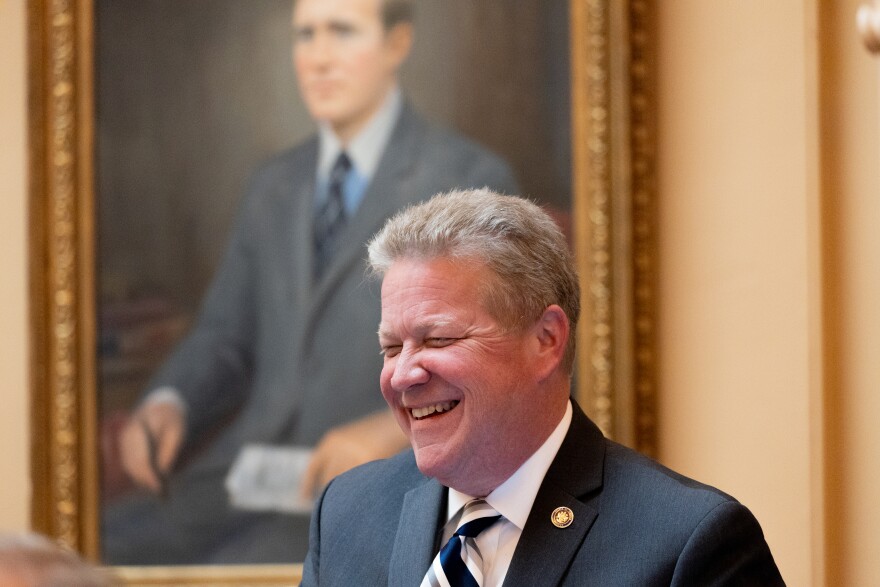A Senate committee on Monday forwarded two bills that would reform how unemployment overpayments follow claimants.
A nonfraudulent overpayment is when the Virginia Employment Commission pays an unemployment claimant more than they are entitled to due to an administrative error. Between July 2022 and June 2023, Virginia’s overpayment rate was about 20%, amounting to over $41 million. Its underpayment rate was .16%.
The federal government requires states to collect 68% of overpayments. But Virginia recovered less than 5% in 2022 and 2023. To recoup the money, Virginia typically garnishes all or half of a beneficiary’s unemployment payments, according to the Virginia Poverty Law Center, which represents benefit claimants.
Virginia currently has one avenue for relief from non-fraudulent overpayments: The state can write off the overpayments after seven years but is not required to. If both proposed bills are signed into law, the VEC would have the option to issue hardship waivers and would be limited in how long it can collect overpayments.
The legislation comes in the wake of pandemic-era reforms and changes at the VEC, after the agency was found to be ill-equipped to deal with surging claims. A 2021 report found that the commission’s recovery rate decreased during the COVID-19 pandemic.
That still affects VEC backlogs today, according to VPLC attorney Flannery O’Rourke.
SB 382 would limit how long the VEC can collect on overpayments to five years. Currently, Virginia can indefinitely collect on overpayments, both fraudulent and non-fraudulent, if it does not write off the debt. The bill would also end repayments upon the death or bankruptcy of an individual.
These proposed changes to mandatory write-offs are only for non-fraudulent cases. Fraudulent cases would still be subject to the seven-year optional write-off.
“So, claimants who receive overpayments innocently — meaning without fraud — often do not have the ability to repay,” said Sen. Adam Ebbin (D-Alexandria), who introduced the bill.
SB 536 would provide a process for overpayments to be waived if a person can demonstrate financial hardship. The bill defines that as depriving beneficiaries of basic necessities, like shelter, food, medicine and childcare. A similar waiver existed during the pandemic, but the VEC’s authority to grant them expired in 2022.
HB 1261, the House of Delegates version of the hardship bill, hasn’t yet been heard in the lower chamber.
The limitation on how much time VEC has to collect overpayments was based on recommendations from the joint Commission on Unemployment Compensation. The Labor and Commerce Subcommittee forwarded the Senate version to that chamber’s finance committee.
“I think this is an outstanding bill,” said Sen. Mark Obenshain (R-Rockingham).
O’Rourke, of the VPLC, helped author the bill. She said the proposed changes would be useful for the VEC as an agency — in addition to the relief it could give claimants.
“It gives predictability and finality,” she said. “When they are trying to plan for how much it's going to cost for unemployment administration, it's helpful to them if there are clear cut off points.”
The power to write off or waive overpayment debts also assists the commonwealth with federal compliance. The waivers and write-offs would reduce the total amount Virginia has to collect to fulfill federal requirements — tied to accessing federal funding — for overpayment recovery.
Another bill — SB 381, which has not been heard by committee yet — would change how employers are required to submit information. If an employer fails to respond adequately or in a timely fashion to a request for information from the VEC, they waive rights connected to the claim.
According to the VPLC, “inadequate job separation information” is to blame for about half of Virginia’s overpayments.
At Monday’s meeting, the committee also forwarded SB 542, which would exempt employer lockouts from being considered labor disputes, making locked-out employees eligible for unemployment benefits.
Lockouts are employer-initiated work stoppages in response to a labor dispute. In 2021, DuPont locked out 95 employees at a facility in Chesterfield County and later settled for $3.6 million in backpay, the Richmond Times-Dispatch reported.
Sen. Bill Stanley was the lone Republican voting with Democrats to forward that bill.




